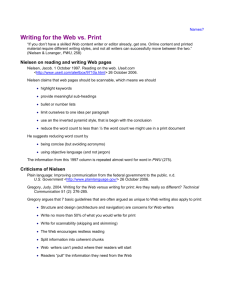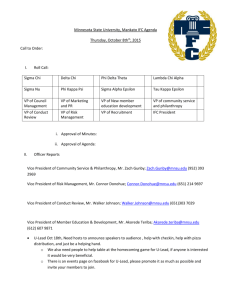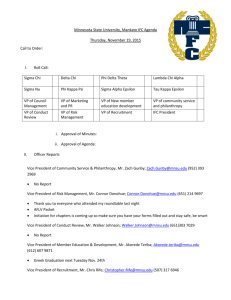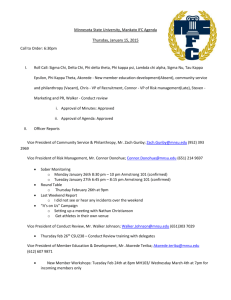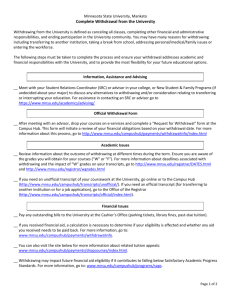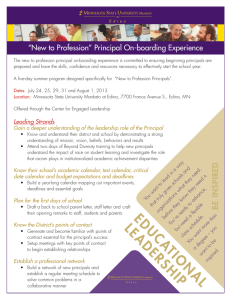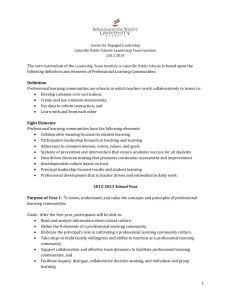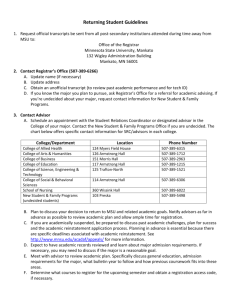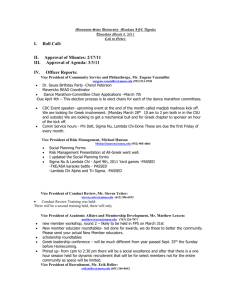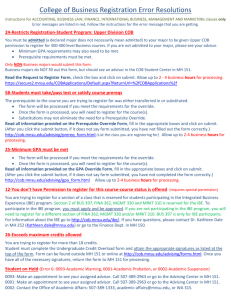SOC 101 – Introduction to Sociology
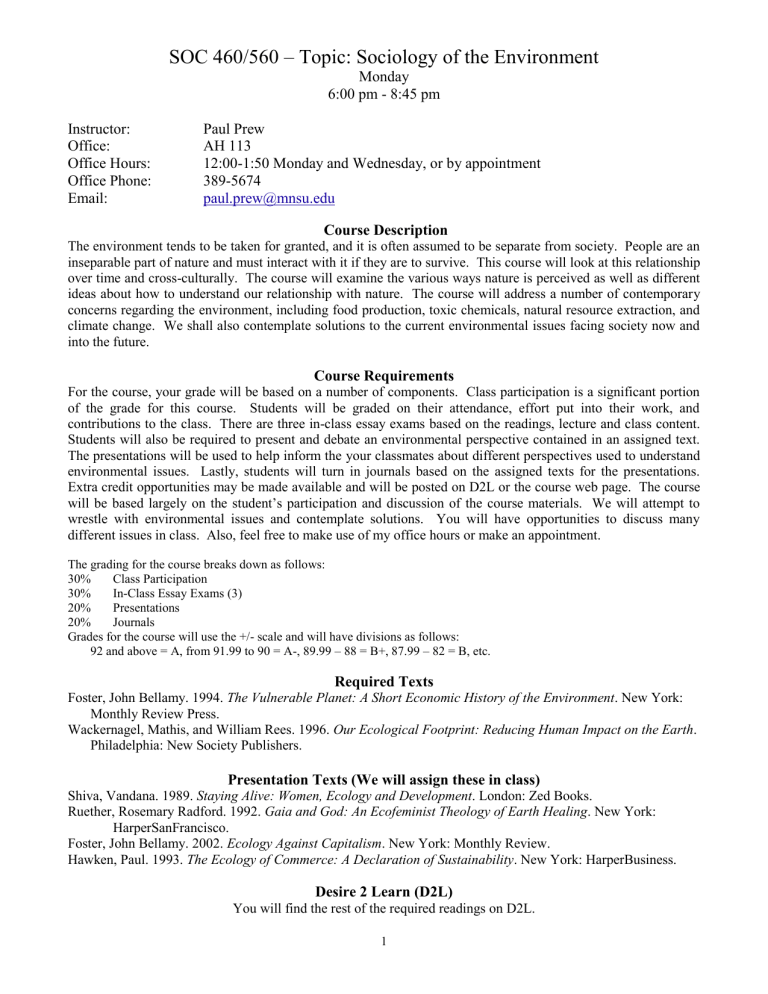
SOC 460/560 – Topic: Sociology of the Environment
Monday
6:00 pm - 8:45 pm
Instructor: Paul Prew
Office: AH 113
Office Hours: 12:00-1:50 Monday and Wednesday, or by appointment
Office Phone: 389-5674
Email: paul.prew@mnsu.edu
Course Description
The environment tends to be taken for granted, and it is often assumed to be separate from society. People are an inseparable part of nature and must interact with it if they are to survive. This course will look at this relationship over time and cross-culturally. The course will examine the various ways nature is perceived as well as different ideas about how to understand our relationship with nature. The course will address a number of contemporary concerns regarding the environment, including food production, toxic chemicals, natural resource extraction, and climate change. We shall also contemplate solutions to the current environmental issues facing society now and into the future.
Course Requirements
For the course, your grade will be based on a number of components. Class participation is a significant portion of the grade for this course. Students will be graded on their attendance, effort put into their work, and contributions to the class. There are three in-class essay exams based on the readings, lecture and class content.
Students will also be required to present and debate an environmental perspective contained in an assigned text.
The presentations will be used to help inform the your classmates about different perspectives used to understand environmental issues. Lastly, students will turn in journals based on the assigned texts for the presentations.
Extra credit opportunities may be made available and will be posted on D2L or the course web page. The course will be based largely on the student’s participation and discussion of the course materials. We will attempt to wrestle with environmental issues and contemplate solutions. You will have opportunities to discuss many different issues in class. Also, feel free to make use of my office hours or make an appointment.
The grading for the course breaks down as follows:
30% Class Participation
30% In-Class Essay Exams (3)
20% Presentations
20% Journals
Grades for the course will use the +/- scale and will have divisions as follows:
92 and above = A, from 91.99 to 90 = A-, 89.99 – 88 = B+, 87.99 – 82 = B, etc.
Required Texts
Foster, John Bellamy. 1994. The Vulnerable Planet: A Short Economic History of the Environment . New York:
Monthly Review Press.
Wackernagel, Mathis, and William Rees. 1996. Our Ecological Footprint: Reducing Human Impact on the Earth .
Philadelphia: New Society Publishers.
Presentation Texts (We will assign these in class)
Shiva, Vandana. 1989. Staying Alive: Women, Ecology and Development . London: Zed Books.
Ruether, Rosemary Radford. 1992. Gaia and God: An Ecofeminist Theology of Earth Healing . New York:
HarperSanFrancisco.
Foster, John Bellamy. 2002. Ecology Against Capitalism . New York: Monthly Review.
Hawken, Paul. 1993. The Ecology of Commerce: A Declaration of Sustainability . New York: HarperBusiness.
Desire 2 Learn (D2L)
You will find the rest of the required readings on D2L.
1
Critical Thinking
Many of the issues that we will cover in this course are complex and do not lend themselves to easy answers.
Hopefully, you will develop more questions as we progress through the class. We will focus on alternative views to understanding contemporary environmental issues. Sometimes, the material may make you uncomfortable – this is natural, and it means that you are confronting commonly held beliefs, which is one of the goals of
Sociology. We will attempt to contrast various views, but we will not be able to address all of the various perspectives regarding the environment. You are encouraged to contrast these views with your own and contemplate more deeply the ideas you feel are important. It does not mean that you must change your perspective, only that you engage in critical thinking to analyze the world around you.
Course Expectations
I have certain expectations for you when you are in the classroom. A few things are crucial for successful completion of this course. First, students are expected to have completed all of the relevant readings prior to coming to class. Students must complete the readings in order to participate regularly in class discussions. Class participation will be weighted heavily as part of the graded portion of the class. Since you must be present to participate in class, attendance will be part of your participation grade. Mere presence in class is not sufficient for participation. Students using laptops, checking cell phones, or otherwise distracted during the class will be considered absent from class. I may stop the class if students are using laptops, checking cell phones, or otherwise distracting other students in the class, and students distracting others may be asked to leave. If you prefer to use laptops to take notes, you must get approval from the instructor and sit in the front row of the class.
After the first week, more than two absences will count against participation. Also included in participation are inclass assignments. Your participation and performance will also be evaluated by the professor.
Quality of Work and “Academic Honesty”
Students are responsible for ensuring that their assignments, essays and general intellectual contributions are their own. In other words, I demand that the students’ contributions are the result of their own creativity and critical assessment of the material covered during this course.
I encourage students to study together and discuss the course material outside of class, but do not write your assignments together. Intentional or unintentional similarities in papers may result in the students failing the assignment. This includes borrowing portions or whole essays from another source such as a friend or “paper mill.” Serious instances of using authors’ ideas without proper credit, submitting a paper that is not your own work, or similarities between student papers may result in a failing grade for the course. Academic dishonesty in the form of using notes during exams, or copying answers from neighboring students, etc. will result in a “0” for the exam. Be careful not to have open notebooks, texts or notes around you during the tests. Students found with notes or using a neighbor’s exam to answer their own test will be asked to leave the exam and will not receive a grade for the test.
Students’ Needs
Please let me know if you have any need for accommodations in the classroom to meet your needs. I realize that students have different learning styles and different needs. While this is a large class, I will do my best to help you in any way I can. My objective in this course is to get you to look at the world in a different, more sociological, way. My goal is not to “weed out” those who cannot do well on a test. In this way, I do encourage you to use my office hours or make an appointment to discuss the course material, concerns you may have, or general issues relevant to the course. For those of you who may have more specific needs, MSU-Mankato provides students with disabilities reasonable accommodation to participate in education programs, activities or services. Students with disabilities requiring accommodation to participate in class activities or meet course requirements should first register with the Office of Disability Services (contact info below) and then contact me as soon as possible.
2
Resources for Students on Campus
There are many resources on campus for students, especially those new to the campus. Below you can find the location and contact information for various services on campus. They are there for you, so take advantage of them. All of these resources are aimed at helping you succeed and excel while you are here. Please ask me if there is anything I can help you find. I may be able direct you to other offices that can help you out.
Tutoring and Other Services for All Students
Center for Academic Success
Memorial Library in ML 125 (lower level)
Phone: 507-389-1791
Email: academicsuccess@mnsu.edu http://www.mnsu.edu/supersite/academics/success/
General Information and Help with Study Skills
Student Relations, College of Social and
Behavioral Sciences
Ethnic Student Population Resources
Office of Multicultural Affairs
243 Centennial Student Union
Mankato, MN 56001
Phone: 507-389-6300 http://www.mnsu.edu/cultdiv/programs/
Academic Support In Writing, Reading And
Computer Literacy For Underrepresented
Students
Advising "U"
Armstrong Hall 114
Phone No: 507-389-6306 http://sbs.mnsu.edu/prospective/advisingu.html
Resources for International Students
The International Student Office (ISO)
Kearney International Center
250 Centennial Student Union
Phone: 507-389-1281 (V) or 800-627-3529
Diversity English Institute (IDEI)
Intercultural Center, CSU 269
Phone: 507-389-5594
Email: amy.mukamuri@mnsu.edu http://www.mnsu.edu/cultdiv/ei/
Resources for First-Generation College Students and Others
Student Support Services
355 Wiecking Center
(MRS/TTY)
E-mail: iso@mnsu.edu http://www.mnsu.edu/iso/
Facilities and Resources for Students with
Disabilities
Office of Disability Services
132 Memorial Library (lower level)
Phone: 507-389-2825 (Voice/TTY)
Email: julie.snow@mnsu.edu http://www.mnsu.edu/dso/index.html
Phone: (507) 389-2797 http://trio.mnsu.edu/sss.html
Confidential Help to Assist Students in Resolving
Personal, Social, and Educational Concerns
The Counseling Center
245 Centennial Student Union (CSU)
Phone: (507) 389-1455 http://www.mnsu.edu/counseling/
Student Health Services
Medical Clinic
21 Carkoski Commons
Phone: 507-389-6276
Health Education
100 Carkoski Commons
Phone: 507-389-5689 http://www.mnsu.edu/shs/
Weekly Readings
(For each week, read the entire chapter unless otherwise noted)
Week 1
3
(January 12)
Introduction to the course.
The Vulnerable Planet: Chapter 1
Week 2
(January 19 No Class – Dr. Martin Luther King Jr. Day)
How can we measure your impact on the environment?
Our Ecological Footprint: Chapters 1 and 2
Take the Ecological Footprint Quiz at http://www.myfootprint.org/en/visitor_information/
(I will also provide a hard copy on the first day of class)
Watch The Story of Stuff at http://www.storyofstuff.com/ and complete the one-page assignment at the end of the hard copy of the Footprint Quiz.
Week 3
(January 26)
The impact of individuals on the environment: How connected are we to the world around us?
Our Ecological Footprint: Chapter 3
Film: The Ad and the Ego
Week 4
(February 2)
Ways of Knowing: How do we understand the world around us, and how do sociologists understand the environment?
Joseph Bruchac – The Circle Is the Way
Leslie Marmon Silko – Interior and Exterior Landscapes: The Pueblo Migration Stories
Leslie Marmon Silko – The People and the Land Are Inseparable
Winona La Duke – Salt, Water, Blood, and Coal: Mining in the Southwest
Salvador Palomino – Three Times, Three Spaces in Cosmos Quechua
Week 5
(February 9)
Societies and nature: How do various cultures impact the environment?
The Vulnerable Planet: Chapter 2, 3, and 4
Exam 1 – February 9 !!!
Week 6
(February 16)
The impact of capitalism: How does the logic of our society ensure environmental destruction?
The Vulnerable Planet: Chapters 5, 6, and 7
Film: Taken for a Ride
Journal 1 – Due Feb. 16
The journal will cover the following pages:
Shiva
Ruether
Foster
Hawken
= 1-95
= 15-111
= 7-59
= 1-74
4
Week 7
(February 23)
*** NOTE: Class will be held in Ostrander Auditorium ***
Climate change.
Paul Mayewski and Frank White – The Ice Chronicles: Chapters 3, 5 and 6
Peter Schwartz and Doug Randall – An Abrupt Climate Change Scenario and Its Implications for United
States National Security
Film: The 11 th Hour (NOTE: Class and film will be held in Ostrander Auditorium)
Week 8
(March 2)
The natural resource industry and indigenous peoples.
Al Gedicks - Resource Rebels: Chapter 2, Big Oil, the Environment and Human Rights
Film: Extreme Oil
Spring Break
(March 9)
Week 9
(March 16)
Food self-sufficiency
Vandana Shiva – Stolen Harvest: Chapters 1, 2, and 3.
Film: The Future of Food
Exam 2 – March 16 !!!
Journal 2 – Due March 16
The journal will cover the following pages:
Shiva = 96-178
Ruether
Foster
Hawken
= 115-201
= 60-103
= 75-159
Week 10
(March 23)
Toxins in our environment
Eddie Girdner and Jack Smith – Killing Me Softly: Chapter 1: The Toxic Political Economy
Eddie Girdner and Jack Smith – Killing Me Softly: Chapter 4: The People’s Struggle Against Amoco
Waste-Tech in Mercer County, Missouri
Film: Toxic Sludge is Good for You
Week 11
(March 30)
Social movements and solutions to environmental issues.
Julia Fox- Mountaintop Removal in West Virginia
Mik Moore – Coalition Building Between Native American and Environmental Organizations in
Opposition to Development
Journal 3 – Due March 30
The journal will cover the following pages:
Shiva = 179-224
Ruether
Foster
Hawken
= 205-274
= 104-168
= 161-219
5
Week 12
(April 6)
Social movements and solutions to environmental issues.
Our Ecological Footprint: Chapters 4 and 5
Peter Rosset – Alternative Agriculture Works: The Case of Cuba
Exam 3 – April 6 !!!
Week 13
(April 13)
Book presentations – Ecofeminism.
Vandana Shiva – Staying Alive: Women, Ecology and Development
Rosemary Radford Ruether – Gaia & God: An Ecofeminist Theology of Earth Healing
Extra Credit Due – April 13 !!!
Week 14
(April 20)
Book presentations – Capitalism and Ecology.
John Bellamy Foster: Ecology Against Capitalism
Paul Hawken: The Ecology of Commerce
Week 15
(April 27)
Course Wrap Up (May also finish Book Presentations)
(No Readings)
Final Exam Week
(May 4)
Course Field Trip
(TBA)
6
